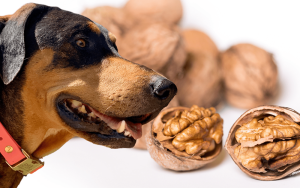Can Dogs Eat Broccoli? A Complete Guide to Safely Feeding Broccoli to Your Dog

As a responsible dog owner, one of your primary concerns is making sure your furry friend gets the best possible nutrition. With an increasing number of healthy foods becoming popular among humans, it’s natural to wonder if certain human foods can also
be safe and beneficial for dogs. One such food that often sparks curiosity is broccoli. While broccoli is undoubtedly a healthy vegetable for people, the question remains: Can dogs eat broccoli?
In this comprehensive guide, we’ll explore everything you need to know about feeding broccoli to your dog, from the potential health benefits and risks to how to prepare it safely. By the end, you’ll have all the information you need to make an informed
decision about whether or not broccoli should become a part of your dog’s diet.
Table of Contents
- Introduction to Broccoli: What Makes It Healthy?
- Is Broccoli Safe for Dogs?
- Health Benefits of Broccoli for Dogs
- Possible Risks and Side Effects of Broccoli for Dogs
- How to Safely Feed Broccoli to Your Dog
- How Much Broccoli Can Dogs Eat?
- Broccoli Alternatives for Dogs
- Conclusion: Should You Add Broccoli to Your Dog’s Diet?
1. Introduction to Broccoli: What Makes It Healthy?
Broccoli is a green vegetable that belongs to the cruciferous family, which also includes cabbage, cauliflower, and Brussels sprouts. Known for its high nutrient content, broccoli is packed with vitamins, minerals, fiber, and antioxidants. These nutrients
support human health in various ways, including boosting the immune system, promoting healthy digestion, and fighting inflammation.
But what about your dog? Is this vegetable as beneficial for them as it is for humans? Before we dive into whether dogs can safely consume broccoli, let’s first take a look at the key nutritional components that make this vegetable so healthy.
Nutritional Profile of Broccoli:
- Vitamins: High in vitamin C, vitamin K, and several B vitamins.
- Minerals: Rich in calcium, iron, potassium, and magnesium.
- Fiber: Helps with digestive health.
- Antioxidants: Contains compounds that can help fight free radicals and reduce inflammation.
2. Is Broccoli Safe for Dogs?
The good news is that yes, broccoli is generally safe for dogs when given in moderation. It is not toxic to dogs and does not pose the same risks as some other human foods, like chocolate or onions. In fact, many pet owners choose to
feed their dogs broccoli as a healthy, low-calorie treat.
However, while broccoli is not toxic, it’s important to remember that not all foods are suitable for every dog. Dogs have different digestive systems and tolerances, so what works well for one dog may not be ideal for another.
3. Health Benefits of Broccoli for Dogs
When prepared properly, broccoli can offer several health benefits for dogs. Let’s explore the specific advantages of adding this veggie to your dog’s diet:
A. Rich Source of Antioxidants
Broccoli is loaded with antioxidants, which help combat oxidative stress in the body. In dogs, oxidative stress can lead to cellular damage and contribute to conditions like arthritis, heart disease, and cancer. Antioxidants, like those found in broccoli,
can help neutralize harmful free radicals, promoting overall health.
B. Supports Immune Health
Broccoli contains significant amounts of vitamin C, an essential nutrient that supports your dog’s immune system. While dogs can produce vitamin C naturally, providing extra vitamin C through their diet can further boost their immune defenses, helping
them fight off illnesses.
C. Digestive Health
The fiber content in broccoli is beneficial for your dog’s digestive health. Fiber helps regulate bowel movements, prevent constipation, and support a healthy gut. Adding fiber-rich foods like broccoli to your dog’s diet can contribute to better overall
digestion.
D. Anti-Inflammatory Properties
Broccoli contains compounds like sulforaphane that have natural anti-inflammatory effects. These compounds can help reduce inflammation in the body, which is especially helpful for dogs with arthritis or other inflammatory conditions.
E. Low in Calories and Fat
If you’re watching your dog’s weight or trying to prevent obesity, broccoli can be an excellent snack choice. It’s low in both calories and fat, making it a healthier alternative to more calorie-dense dog treats. It’s also high in water content, helping
to keep your dog hydrated.
4. Possible Risks and Side Effects of Broccoli for Dogs
While broccoli offers numerous benefits, there are some risks and side effects that dog owners should be aware of. Understanding these potential concerns will help you determine the appropriate way to incorporate broccoli into your dog’s diet.
A. Gastrointestinal Upset
Broccoli contains a compound called isothiocyanate, which can cause gastrointestinal issues in dogs, such as gas, bloating, and diarrhea. This compound can be irritating to your dog’s digestive system, especially if consumed in large
quantities.
B. Risk of Choking
Because broccoli is a fibrous vegetable, larger pieces can pose a choking hazard for dogs, especially smaller breeds. To reduce this risk, always cut the broccoli into small, bite-sized pieces that your dog can chew easily.
C. Thyroid Issues (Excessive Consumption)
In large quantities, cruciferous vegetables like broccoli contain goitrogens, compounds that can interfere with thyroid function. While dogs would need to eat an excessive amount of broccoli for this to become a concern, it’s something to keep in mind
if you’re feeding broccoli frequently.
5. How to Safely Feed Broccoli to Your Dog
To ensure that your dog enjoys the benefits of broccoli without the risks, here are some tips on how to safely feed this vegetable to your pet:
A. Start Slowly
Introduce broccoli to your dog’s diet gradually. Start with small amounts to see how they react. Monitor your dog for any signs of gastrointestinal upset, such as vomiting or diarrhea. If they tolerate it well, you can increase the amount gradually.
B. Cook the Broccoli
While dogs can eat raw broccoli, cooking the vegetable can make it easier for your dog to digest. Steaming or lightly cooking broccoli will soften the fibers and reduce the potential for gastrointestinal upset. Avoid seasoning or adding oils, as these
can be harmful to dogs.
C. Remove Stems
The stems of broccoli are tougher and more fibrous, which can be harder for your dog to chew and digest. Remove the tough stems and cut the broccoli into small florets to make it easier for your dog to eat safely.
D. Serve in Moderation
As with any treat, moderation is key. Broccoli should only make up a small portion of your dog’s overall diet. Treats should not exceed 10% of your dog’s daily caloric intake.
6. How Much Broccoli Can Dogs Eat?
The amount of broccoli you can safely feed your dog depends on their size, breed, and individual tolerance. As a general guideline:
- Small dogs (under 20 pounds): 1 to 2 small florets per day.
- Medium dogs (20 to 50 pounds): 3 to 4 florets per day.
- Large dogs (50+ pounds): Up to 5 florets per day.
If your dog has never eaten broccoli before, start with just one small floret and see how they react. If your dog enjoys it and doesn’t experience any adverse effects, you can continue to offer small amounts as a healthy snack.
7. Broccoli Alternatives for Dogs
If your dog isn’t a fan of broccoli or you’re looking for other healthy vegetables to add to their diet, there are plenty of options to choose from:
- Carrots: Great for dental health and a low-calorie snack.
- Green beans: Low in calories and high in fiber.
- Sweet potatoes: Packed with vitamins A and C.
- Spinach: Full of iron and antioxidants, but should be fed in moderation.
- Cucumbers: Hydrating and low-calorie.
8. Conclusion: Should You Add Broccoli to Your Dog’s Diet?
In conclusion, broccoli is safe for dogs in moderation, and it can offer several health benefits, including improved digestion, immune support, and anti-inflammatory properties. However, it’s essential to introduce it slowly, prepare
it properly, and serve it in the right portion sizes. Always monitor your dog for any signs of discomfort and consult your vet if you’re unsure about incorporating broccoli into their diet.
By following these guidelines, you can provide your dog with a nutritious treat that complements their regular meals, promoting overall health and well-being. If you’re ever in doubt, consult your veterinarian, as they can provide personalized advice
based on your dog’s specific health needs.
Incorporating vegetables like broccoli into your dog’s diet can be an excellent way to diversify their meals and provide them with additional nutrients. So, if your dog enjoys the taste of broccoli, feel free to add it to their food rotation as a healthy
and tasty snack!






